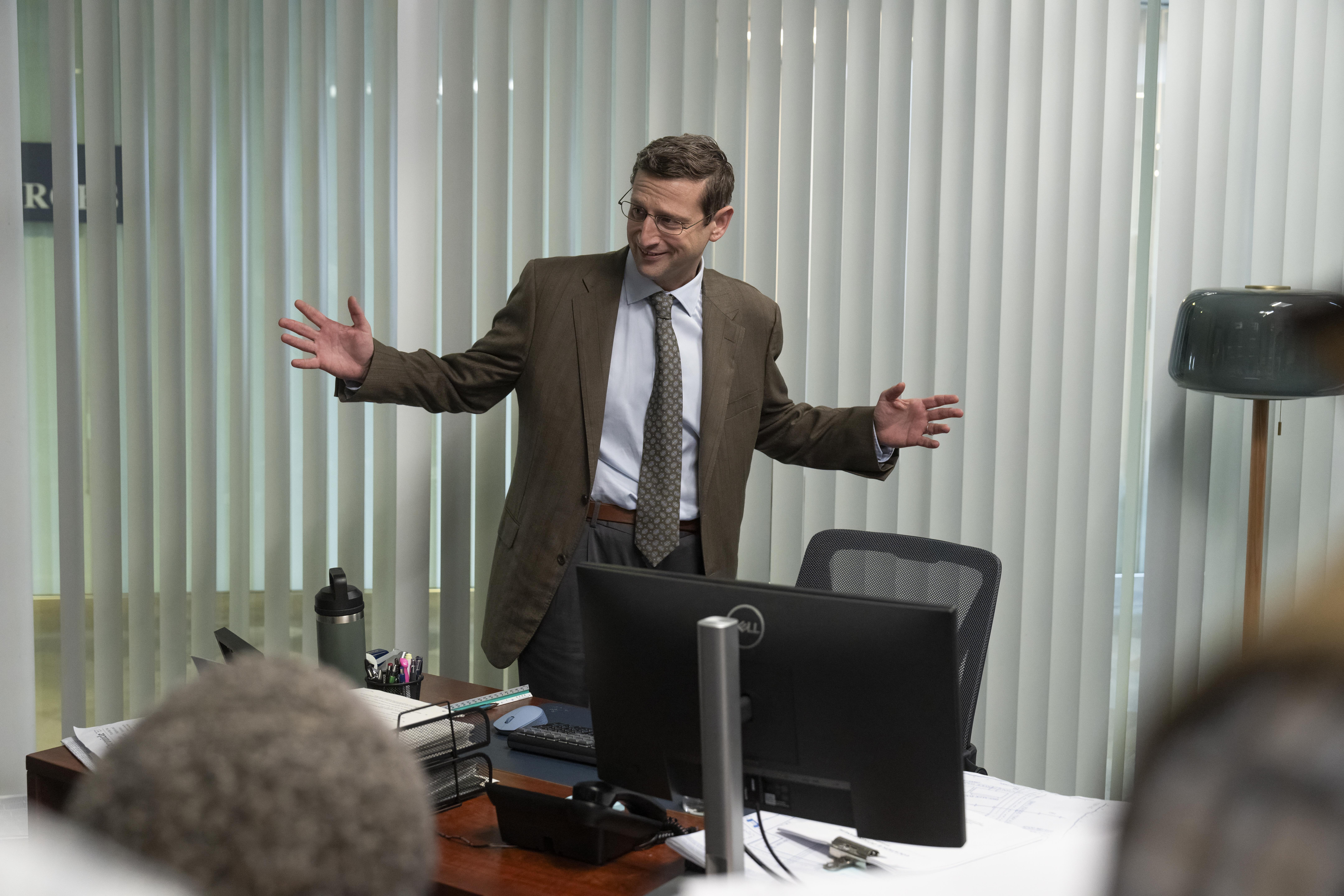Who is the funniest person alive? That might well be an unanswerable question (“How long is a piece of string?”), but there are few people with as convincing a claim to the title as Tim Robinson. The comedian best known for his gonzo Netflix sketch series I Think You Should Leave has, over the past decade, become one of the most reliably ingenious names in comedy. That series was an anarchic medley of deranged faux pas – it’s hard to even describe. (Among the sketches: a toxic “Baby of the Year” pageant; Santa Claus doing a sour press junket to promote an action movie; a party at which hired celebrity impersonators are contractually “allowed” to assault guests.) At the centre of the show: Robinson himself, a raving, gurning, drooling, and all-round singularly bizarre force of nature.
It is on the unflappable strength of Robinson’s brand, no doubt, that HBO commissioned a series titled The Chair Company – a laughably unsexy title, with a premise to match. Debuting last month (on Sky and NOW in the UK), the series follows Ron Trosper (Robinson), an employee at a company organising the development of a new shopping mall. Ron’s cosy suburban life begins to unravel, however, when he starts investigating an inscrutable and far-reaching conspiracy involving Tecca, a chair manufacturer. It’s utter, unpredictable nonsense, and often tremendously funny. Like most of Robinson’s oeuvre – and especially I Think You Should Leave – it seems the kind of thing that will only grow richer on repeat viewings.
Other than Robinson, and unusually for an HBO series, there are few recognisable faces to be seen here. Lake Bell (Boston Legal) plays Ron’s wife, and Sophia Lillis (It, chapters one and two) plays his daughter. Otherwise, the cast is made up of relative unknowns (one major role, that of squirrelly oddball Mike Santini, is played by an actor named Joseph Tudisco). Zach Kanin, Robinson’s frequent collaborator and co-creator of The Chair Company, has said that this was done for realism’s sake. This is perhaps the crux of The Chair Company, and indeed much of Robinson’s work: for all its utter absurdism, there’s something all too real about the worlds he creates. (A second season has been confirmed.)
Robinson is very much a creature of the modern world, whose sensibility – a sort of comic inferno of anger, confusion and embarrassment – speaks directly to a Trump-era America. His breakthrough, though, technically came midway through the Obama era, when he was hired as a new cast member on Saturday Night Live in 2012. (Aidy Bryant and Cecily Strong joined at the same time, the trio replacing Andy Samberg, Kristen Wiig and Abby Elliott.) Robinson, a performer with a very specific tone and range, proved a somewhat difficult fit for the series, and he transitioned after one year to a staff writing position – a first for an SNL star hired solely as a performer. As a writer, though, he faced the same problem, with many of his sketch ideas being shot down for being too outre, or simply too daft. (One such pitch: a sketch about a “leather life jacket for when cool guys fall off a boat”.) Several would later be repurposed for I Think You Should Leave, when mainstream palliability was no longer a concern.
He left SNL in 2016 without much notoriety or a particularly rich bank of produced sketches to his name – but a far keener understanding of the TV industry. He was able to successfully pitch Detroiters, a sharply funny and disarmingly sweet sitcom about two ramshackle ad men in Robinson’s hometown of Detroit; Sam Richardson (Veep) rounded out the consummate double act. Cancelled after just two seasons in 2018, Detroiters never really found an audience on Comedy Central, though it has retained an avid cult fanbase. I Think You Should Leave was a different story. The success of that show, both in terms of formal recognition (including Emmy wins for the series and Robinson as an actor) and word-of-mouth adulation, made Robinson into a thing. By the time The Chair Company, or this year’s theatrically released film Friendship (co-starring Paul Rudd), came around, people knew what to expect from a Tim Robinson vehicle.
It’s interesting to consider how Robinson fits into the broader scheme of comedy – what it is about his work that feels so new. Historically, the cutting edges of comedy, the new frontiers, have been found in the act of simply going further, pushing formal boundaries. It is not hard to trace a direct line from the radical randomness of Monty Python’s Flying Circus through to the pinball online-era surrealism of Tim and Eric, for example. But we now live in an era where most formal boundaries have seemingly been pushed to their limit, in almost every conceivable way – whether that’s absurdity, explicitness of content, or metatextuality. The genius of I Think You Should Leave then comes not from its form, but its content. And its content is quite unlike anything that preceded it.

Robinson’s work upends one of the most fundamental dynamics of narrative comedy: that of the straight man and comic foil. In his sketches, there will often be a character, often but not always played by himself, who fits, ostensibly, into this latter category. A Robinson character is often a disruptive, maladjusted man, unable to grasp or comply with the unwritten rules of social conduct. But the more you watch, the more you become entranced by the oddity of everyone else’s behaviour; the straight men are as alien and unreal as the clowns.
There is something ineffably “off” about Robinson’s dialogue, too – a sort of empty mimicry of real-world social interactions. By the fifth or sixth time you watch a Tim Robinson sketch, you are most tickled not by the outsized slapstick, but by the almost imperceptible off-kilter strangeness of the setup lines, the ever-so-subtly wrong tenor of the seemingly benign. To Robinson, the mundane activities of modern postcapitalist life – office meetings, board game socials, surfing the internet in the dead of night – aren’t so much disrupted by chaos as they are natural forums for it. He doesn’t try to make sense of the world; he exposes its inherent senselessness.

And yet, there comes a point where it becomes fruitless to analyse Robinson’s comedy. If we look at Nathan Fielder’s The Rehearsal – this year’s best and funniest TV show – we see a comedy that invites intricate and complex dissection, a layered heap of dramatic ironies and knowing contradictions. Robinson’s humour seems to come from somewhere more primitive. Above all, he is a man who simply knows what is innately funny – be it something as crude as a squeaky voice, or an antic squint. Getting out of SNL wasn’t just a blessing for his own career – television itself is far richer for it.
‘The Chair Company’ is available to watch on Sky and NOW







